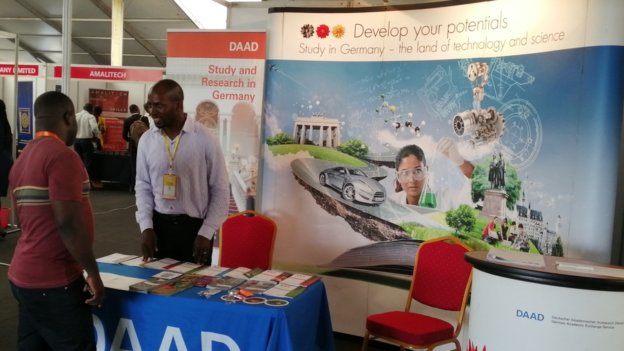
![]()
The Corona Virus outbreak had adverse effects on business, many firms had to reduce their staff, which contributed to increasing the unemployment rate. Some of the measures by the Government to manage the situation were a lockdown of the Greater Accra Region and a ban on public gatherings such as physical job fairs. To this end, the Ghanaian-German Centre for Jobs, Migration and Reintegration (GGC) of the Deutsche Gesellschaft für Internationale Zusammenarbeit (GIZ) GmbH, in partnership with the Ghanaian Ministry for Employment and Labour Relations (MELR) and the Delegation of German Industry and Commerce in Ghana (AHK Ghana) organized the Ghana Virtual Career Fair 2020 on July 8th.
Our Approach
The fair was mainly targeted at providing a platform for job seekers to acquire the necessary skill set and the mindset for innovative and sustainable approaches to employability in this fast-paced world. Through this platform, job seekers and employers could meet and mingle directly in video calls. Employers were bundled in a fair-like section of the platform, showcasing their brands, which could be accessed by the job seekers. Furthermore, the platform also featured a section for online trainings via video-based presentations. In preparing the job seekers for a perfect matching performance at the Ghana Job Fair, the virtual career fair offered training in employability and soft skills for the participants ahead of the main fair. Some employers were also featured to provide information on the qualities they seek in employees to better orient the jobseekers. The platform used for this virtual fair was Hublio, this enabled the implementation of the fair.
Aside from equipping job seekers with the right skills set to excel on the job, the GGC also aimed at inspiring young people to start their businesses, create wealth for themselves and job opportunities for others. Therefore, online-training section of the fair focused on entrepreneurship promotion with the support of hubs and the experience of start-ups. Interactive virtual sessions were organised by the entrepreneurship team and AHK (Delegation of German Commerce and Industry in Ghana).
The fair also allowed stakeholders from the public and private sector to exchange about the state of Ghana’s economy and labour market post-COVID-19. This stakeholders group included: high ranking officials of the public and private sector, HR specialists, experts in digitalization, representatives from innovation hubs. The fair further contributed towards creating a positive outlook on how to adapt and proactively engage the implications of COVID-19 in Ghana (remote work, digitalization, entrepreneurial thinking, employability skills) and providing patrons with tools to do so.
In implementing the fair, various approaches were applied including, multi-stakeholder dialogues, moderated panel discussions and fireside chats and the virtual tools used were webinars and virtual exhibition booths. The online platform which hosted the fair was further made available one month after the event for participants to refer back to the various sessions held on the event day
Key Results
Due to the unstable status of businesses during these times, recruitment of personnel by companies and employers was not a top priority. However, 20 companies were featured at the fair to share their preferences and expectations of recruits to better prepare the jobseekers. These companies also brought a limited number of vacancies to the event (40).
Participants:
- 1752 participants registered: 33% Females and 67% Males.
- 63% of Registered participants took part in the sessions.
Event Content
- 128 Job Vacancies were advertised
- 20 Firms took part as Exhibitors (parallel to the focus on training)
- 37 Speakers/Facilitators led various training sessions
- 25 Vacancies were filled
An Evaluation was done through an online questionnaire, the results reflected the following:
- 58% of participants admit to having improved Employability Skills
- 50% of participants admit to having improved Digital Skills
- 87% were satisfied with the various training sessions
- 91% found the fair very useful
- 93% said they would recommend the fair to other job seekers
Lessons Learnt (Success Factors & Challenges)
- Virtual Platform broadened reach to beneficiaries across the country
- Sustained engagement of stakeholders enhanced platform usability.
- Provision of free mobile data to the first 1000 beneficiaries was a major incentive for sustaining the level of participation
- As much as possible, all sessions of the event must be carried out live and only pre-record as an exception.
- Social media (e.g. Facebook) offers the best option for engaging participants
Challenges
- The engagement time between participants and facilitators was found to be short and should be extended, allowing adequate time for Q&A sessions.
- Sessions should not run concurrently to ensure participants can participate in as many options as they would like.
- The event could be organised in two days to avoid overloading the content
- Mock aptitude tests should be included in the career guidance sessions
- Technical challenges were experienced, test runs should be done before the actual event.
Moving forward
- As an immediate follow-up, the GGC organized a fully-fledged “Ghana Virtual Job Fair” on November 3; the event brought together proximately 1500 job seekers with 39 companies, presenting 251 jobs.
- These events shall be replicated in partnership with the partner Ministry’s Labour Department and private sector agencies.
- It is hoped that the Labour Department will in the future be able to mobilize the requisite resources to make the virtual job or career fairs a permanent part of its yearly programmes
Resources


